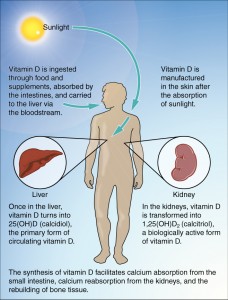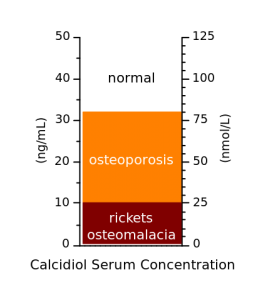During the summer, you may have seen media continuously blasting health warnings about dangers of sun exposure, such as skin deterioration and skin cancer. Surprisingly, too much exposure to sunlight isn’t the major problem, but instead, most people are likely not getting enough. According to an article from Scientific American, in United States, nearly three-quarters people are having vitamin D deficiency and the trend is continuously increasing.
Vitamin D is essential for many body systems. It is vital for bone health such as its metabolism, growth, and maintenance, and also for brain function and cognition processes. In addition, it moderates cell growth, helps the body absorb calcium and phosphorus, and assists in controlling immune function and inflammation.
Below shows how vitamin D works in our body in detail;
Credit: Douglas Bowker
Most vitamin D is produced within the body in response to sunlight exposure. However, occasional exposure of sunlight to our skin is insufficient for vitamin D intake. In order to optimize the levels of vitamin D, exposing large portions of skin to the sun for about 10 to 20 min. is adequate. Moreover, people can easily obtain vitamin D in daily lives through consumptions of fatty fish, fortified milk and cereal, orange juice, egg yolks, and more. Another way is taking vitamin D supplements which are widely available. Too much can be toxic, so one should talk to physicians or doctors beforehand regarding vitamin D supplements.

Synthesis of Vitamin D in Our Body from Sunlight (Image from WikiCommons)
Vitamin D deficiency, can cause osteoporosis (decrease in bone mass), and can increase the risk of fractures. It is common among older adults due to decreased skin abilities to synthesize vitamin D from sunlight. For children in 6-24 months of age, it is common that lacking vitamin D can cause rickets, a disorder that affects bones to soften and weaken.

Vitamin D Levels and Bone Diseases (image from WikiCommons)
According to the article from Times, recent study has shown that Alzheimer’s disease (AD) and dementia are most common in those with insufficient vitamin D. It contributes to faster cognitive decline in older adults, increasing the risks of AD and dementia. In the research, 1,658 adults with an average age of 75.5 and no sign of dementia participated. During the average follow-up of 4.8 years, vitamin D insufficient adults showed a greater decline rate on certain memory, such as episodic memory, and executive function tests, which may correspond to an elevated risk for dementia. Later at the follow-up of 5.6 years, 17.5% of participants had dementia and 32.7% with mild cognitive impairment (MCI), which has a high risk of developing AD and dementia.
For more information on the research, check the video below;
Credit: ARIIX Corporate & Dr. Ray Strand
It is unknown if vitamin D supplementation will slow cognitive decline from AD or dementia and yet, there is no effective treatment against them. Nevertheless, the supplementation can possibly delay or even prevent dementia. Thus, exposure to sunlight and daily consumption of vitamin D are essential in our lives.
Josephina Kim
